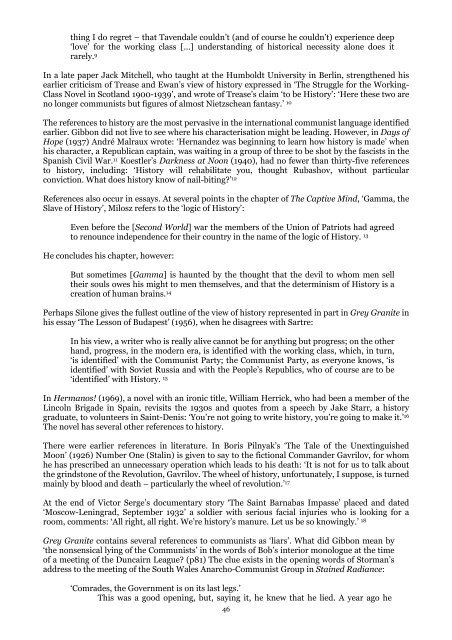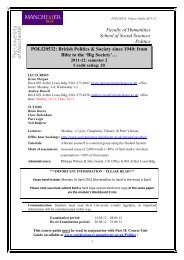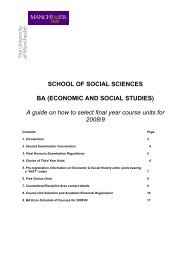CHNN 22, Spring 2008 - School of Social Sciences
CHNN 22, Spring 2008 - School of Social Sciences
CHNN 22, Spring 2008 - School of Social Sciences
Create successful ePaper yourself
Turn your PDF publications into a flip-book with our unique Google optimized e-Paper software.
thing I do regret – that Tavendale couldn’t (and <strong>of</strong> course he couldn’t) experience deep<br />
‘love’ for the working class […] understanding <strong>of</strong> historical necessity alone does it<br />
rarely. 9<br />
In a late paper Jack Mitchell, who taught at the Humboldt University in Berlin, strengthened his<br />
earlier criticism <strong>of</strong> Trease and Ewan’s view <strong>of</strong> history expressed in ‘The Struggle for the Working-<br />
Class Novel in Scotland 1900-1939’, and wrote <strong>of</strong> Trease’s claim ‘to be History’: ‘Here these two are<br />
no longer communists but figures <strong>of</strong> almost Nietzschean fantasy.’ 10<br />
The references to history are the most pervasive in the international communist language identified<br />
earlier. Gibbon did not live to see where his characterisation might be leading. However, in Days <strong>of</strong><br />
Hope (1937) André Malraux wrote: ‘Hernandez was beginning to learn how history is made’ when<br />
his character, a Republican captain, was waiting in a group <strong>of</strong> three to be shot by the fascists in the<br />
Spanish Civil War. 11 Koestler’s Darkness at Noon (1940), had no fewer than thirty-five references<br />
to history, including: ‘History will rehabilitate you, thought Rubashov, without particular<br />
conviction. What does history know <strong>of</strong> nail-biting?’ 12<br />
References also occur in essays. At several points in the chapter <strong>of</strong> The Captive Mind, ‘Gamma, the<br />
Slave <strong>of</strong> History’, Milosz refers to the ‘logic <strong>of</strong> History’:<br />
Even before the [Second World] war the members <strong>of</strong> the Union <strong>of</strong> Patriots had agreed<br />
to renounce independence for their country in the name <strong>of</strong> the logic <strong>of</strong> History. 13<br />
He concludes his chapter, however:<br />
But sometimes [Gamma] is haunted by the thought that the devil to whom men sell<br />
their souls owes his might to men themselves, and that the determinism <strong>of</strong> History is a<br />
creation <strong>of</strong> human brains. 14<br />
Perhaps Silone gives the fullest outline <strong>of</strong> the view <strong>of</strong> history represented in part in Grey Granite in<br />
his essay ‘The Lesson <strong>of</strong> Budapest’ (1956), when he disagrees with Sartre:<br />
In his view, a writer who is really alive cannot be for anything but progress; on the other<br />
hand, progress, in the modern era, is identified with the working class, which, in turn,<br />
‘is identified’ with the Communist Party; the Communist Party, as everyone knows, ‘is<br />
identified’ with Soviet Russia and with the People’s Republics, who <strong>of</strong> course are to be<br />
‘identified’ with History. 15<br />
In Hermanos! (1969), a novel with an ironic title, William Herrick, who had been a member <strong>of</strong> the<br />
Lincoln Brigade in Spain, revisits the 1930s and quotes from a speech by Jake Starr, a history<br />
graduate, to volunteers in Saint-Denis: ‘You’re not going to write history, you’re going to make it.’ 16<br />
The novel has several other references to history.<br />
There were earlier references in literature. In Boris Pilnyak’s ‘The Tale <strong>of</strong> the Unextinguished<br />
Moon’ (1926) Number One (Stalin) is given to say to the fictional Commander Gavrilov, for whom<br />
he has prescribed an unnecessary operation which leads to his death: ‘It is not for us to talk about<br />
the grindstone <strong>of</strong> the Revolution, Gavrilov. The wheel <strong>of</strong> history, unfortunately, I suppose, is turned<br />
mainly by blood and death – particularly the wheel <strong>of</strong> revolution.’ 17<br />
At the end <strong>of</strong> Victor Serge’s documentary story ‘The Saint Barnabas Impasse’ placed and dated<br />
‘Moscow-Leningrad, September 1932’ a soldier with serious facial injuries who is looking for a<br />
room, comments: ‘All right, all right. We’re history’s manure. Let us be so knowingly.’ 18<br />
Grey Granite contains several references to communists as ‘liars’. What did Gibbon mean by<br />
‘the nonsensical lying <strong>of</strong> the Communists’ in the words <strong>of</strong> Bob’s interior monologue at the time<br />
<strong>of</strong> a meeting <strong>of</strong> the Duncairn League? (p81) The clue exists in the opening words <strong>of</strong> Storman’s<br />
address to the meeting <strong>of</strong> the South Wales Anarcho-Communist Group in Stained Radiance:<br />
‘Comrades, the Government is on its last legs.’<br />
This was a good opening, but, saying it, he knew that he lied. A year ago he<br />
46
















